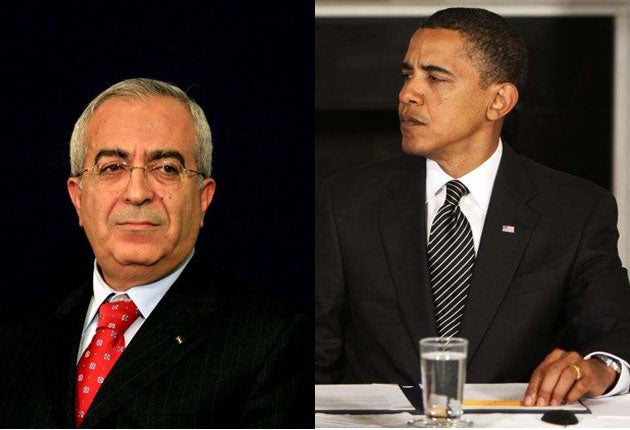World Focus: Why Palestinians have lost faith in Obama

Your support helps us to tell the story
From reproductive rights to climate change to Big Tech, The Independent is on the ground when the story is developing. Whether it's investigating the financials of Elon Musk's pro-Trump PAC or producing our latest documentary, 'The A Word', which shines a light on the American women fighting for reproductive rights, we know how important it is to parse out the facts from the messaging.
At such a critical moment in US history, we need reporters on the ground. Your donation allows us to keep sending journalists to speak to both sides of the story.
The Independent is trusted by Americans across the entire political spectrum. And unlike many other quality news outlets, we choose not to lock Americans out of our reporting and analysis with paywalls. We believe quality journalism should be available to everyone, paid for by those who can afford it.
Your support makes all the difference.For a man who is sometimes seen as the Palestinian politician that the Israelis and the Americans like best, Prime Minister Salaam Fayyad was in a strikingly robust mood during a two-hour press conference in Ramallah yesterday. While too polite to criticise the Obama administration, he nevertheless had a clear message in the wake of the failure by the US to persuade the Israeli government of Benjamin Netanyahu to grant a freeze on Jewish settlement construction in the West Bank as a precursor to serious negotiations.
He suggested that the Palestinian leadership no longer had much interest in a "process for the sake of a process" and he questioned what Mr Netanyahu's "equivocal" endorsement of a Palestinian state really meant.
Mr Fayyad had been much struck by a report from the Jerusalem Centre for Public Affairs, arguing that the 60 per cent of the West Bank controlled by Israel and designated as Area C under the Oslo accords, including the Jordan Valley, should not be handed over in any peace deal. If the Israeli establishment was envisaging a "Mickey Mouse state" along these lines, he said, then "it looks like it would not come close to what we have in mind."
As a former senior official in the World Bank, Mr Fayyad does not speak loosely. And it was hard to infer from what he said anything other than that the moderate Palestinian leadership will not – at least if he has his way – simply yield to US pressure for talks when Israel has successfully rejected such pressure for a settlement freeze.
There are probably several reasons for the somewhat sharper line that is emerging from Ramallah. The mishandling of the Goldstone report on the Gaza war – over which Palestinian diplomats agreed, again under US pressure, to defer a vote at the UN Human Rights Council – has provoked harsh internal criticism.
Mr Fayyad was almost certainly not involved in the decision – diplomacy is not his job – and indeed most of the criticism was directed at the Palestinian President Mahmoud Abbas. But that decision – now reversed – has marked a growing realisation within the West Bank leadership that there may not be too much point in serially yielding to US demands if the Palestinian Authority's own internal standing is compromised as a result.
In the case of Mr Fayyad, there is another factor. He has a plan: a blueprint, to be enacted over the next two years, for a Palestinian state. He intends to go ahead with those preparations whether or not negotiations progress.
His plan has credibility, if only because he has done a good deal – praised by the World Bank – to improve the authority's financial management, security forces, and provision of services to West Bank residents.
Mr Fayyad is too intelligent to think that a mere blueprint can end the occupation. But he would like to see the UN Security Council endorse it – with US backing – as the basis of a resolution designed to bring the end of conflict nearer. Whether the US would be prepared to back that is open to question given its actions – or critics would say lack of them – over the past few months.
Mr Fayyad appears to believe that pressing on with his plan is the best way of serving the West Bank public while at the same time showing the world that the Palestinians are fully ready for a two-state solution.
In the absence of the meaningful negotiations that Mr Fayyad seems to doubt can happen with Mr Netanyahu, it isn't hard to understand that he feels this is the best available strategy.
Join our commenting forum
Join thought-provoking conversations, follow other Independent readers and see their replies
Comments